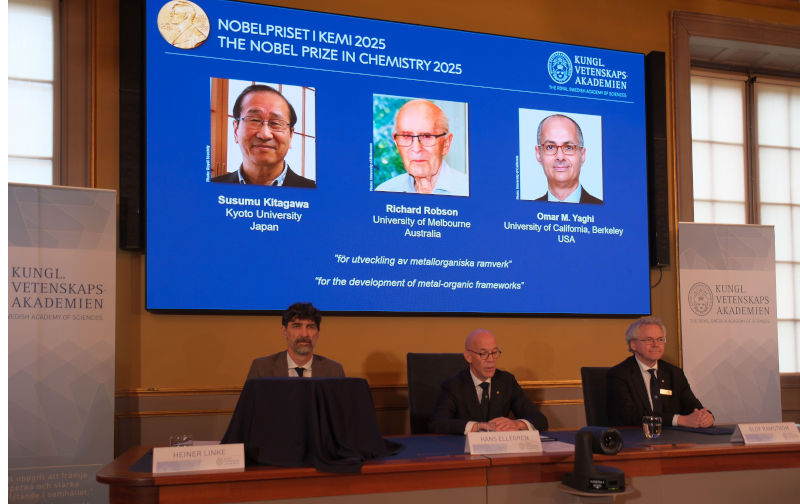Omar Yaghi: Refugee from Gaza wins 2025 Nobel Prize in chemistry
October 12, 2025
Born in a one-room home on the outskirts of Amman, the son of illiterate Palestinian refugees from Gaza, Professor Omar Yaghi has risen from the hardships of displacement to the highest pinnacle of scientific achievement by winning the 2025 Nobel Prize in Chemistry.
Professor Yaghi, now 60, shares the prize with Professor Susumu Kitagawa of Kyoto University and Professor Richard Robson of the University of Melbourne for pioneering the development of metal-organic frameworks – porous, sponge-like materials capable of capturing gases, storing clean energy, and even harvesting water from desert air.
For a man who once queued for hours every fortnight hoping water would reach his family’s tap, it is a poetic full circle.
“I grew up in a very humble home,” Yaghi recalled in a recent interview. “We were a dozen of us in one room, sharing it with the cattle we raised. My parents could barely read or write. My father finished sixth grade, and my mother couldn’t read at all. It’s quite a journey – but science allows you to do it. Science is the greatest equalising force in the world.”
Yaghi’s parents were among the thousands forced from the village of Al-Masmiyya, near Gaza, during the 1948 Nakba. They rebuilt their lives in Jordan, surviving on subsistence farming in a home without electricity or running water.
As a boy, Omar would wake before dawn to catch the brief window when the taps ran – a formative experience that instilled in him both patience and purpose.
At just 15, encouraged by his father to seek education abroad, Yaghi moved alone to the US, knowing little English and armed only with determination. He began at Hudson Valley Community College, later transferring to the State University of New York at Albany, where he completed his undergraduate degree.
In 1990, he earned his PhD in chemistry from the University of Illinois at Urbana-Champaign, followed by post-doctoral work at Harvard University.
What began as an intellectual fascination with “building beautiful things” grew into a revolutionary field known as reticular chemistry – the science of linking molecular building blocks into strong, open frameworks.
In the 1990s, Yaghi’s experiments defied conventional chemistry by producing stable crystalline structures that could trap gases, filter toxins, and store energy. These structures — metal-organic frameworks — have since inspired applications from clean-energy storage to water generation in arid regions.
The Nobel Committee likened MOFs to Mary Poppins’ carpet bag or Hermione Granger’s handbag: compact on the outside yet capable of holding enormous internal space.
“I set out to build beautiful things and solve intellectual problems,” Yaghi told the Nobel Prize’s Adam Smith. “The deeper you dig, the more beautifully you find things are constructed.”
Today, Professor Omar Mwannes Yaghi serves as the James and Neeltje Tretter Professor of Chemistry at the University of California, Berkeley, and directs the Berkeley Global Science Institute, which promotes scientific opportunity for youth from developing countries.
Earlier this year, he was appointed president of the World Cultural Council, an international body celebrating cultural and scientific excellence.
He has received a large number of awards including the prestigious King Faisal International Prize in Chemistry in 2015.
Beyond academia, Yaghi has founded several technology start-ups translating his discoveries into real-world solutions for carbon capture and atmospheric water harvesting — a personal mission rooted in his childhood memories of thirst and scarcity.
Professor Yaghi’s journey from refugee hardship to Nobel recognition has resonated deeply across the Arab and Muslim worlds, especially among displaced and marginalised communities who see in his story a testament to resilience, curiosity and faith in human potential.
“Smart, talented people exist everywhere,” Yaghi emphasised. “We just need to unleash their potential through opportunity.”
His life stands as a reminder that brilliance knows no borders – that the child waiting for a trickle of water in a dusty Jordanian village can grow up to help the world drink from the air itself.
Republished from AMUST, 10 October 2025
The views expressed in this article may or may not reflect those of Pearls and Irritations.

